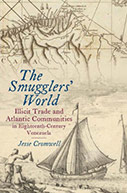The Smugglers’ World: Illicit Trade And Atlantic Communities In Eighteenth-Century Venezuela

Author: Jesse Cromwell
Publisher: Chapel Hill, NC: University of North Carolina Press, 2018. 336p.
Reviewer: David Head │ July 2020
When I was a teenager, I played a lot of the computer game Pirates! by Sid Meier. It was one of the things that hooked me on history—and pirates. In the game, you played a swashbuckling pirate (actually, you were more a commissioned privateer) sailing the seventeenth- and eighteenth-century Caribbean and visiting various ports to woo the governor’s daughter, buy a treasure map from a scruffy buccaneer, or trade with the local merchant. You could buy and sell across imperial lines pretty openly, if I remember correctly, with one exception: the major Spanish port merchants refused your business. Spain’s smaller colonies, though, might open their doors, if they wanted your booty badly enough.
That touch of realistic game play came to mind when reading Jesse Cromwell’s insightful new history of smuggling in eighteenth-century Venezuela. The colony’s ports were definitely the kind of places that welcomed trade from anyone. As Cromwell shows, illegal commerce was everywhere, and seemingly everyone smuggled, from shopkeepers to sailors, government officials to Jesuit priests (unsurprisingly).
Venezuelans smuggled not because they were especially unscrupulous, but because they had few legal alternatives. Spanish ships usually bypassed the colony, forcing Venezuelans to find alternate markets for their agricultural produce and other, unofficial sources for their finished goods. Venezuela produced much-prized cacao, but through the early 1700s at least, it was gold and silver Spain was after. With very little in the way of precious metals, the great treasure fleets sailed on to more lucrative ports.
Over the eighteenth century, Europeans’ hunger for chocolate grew ravenous, and the best cacao, connoisseurs agreed, came from Venezuela. Finally having a reason to care about the colony, Spanish officials tried to crack down on smuggling, but by then it was too late. Smuggling was a way of life, and Venezuelans counted on Spain’s blind eyes as a permanent right, not a temporary oversight. A series of conflicts ensued until late in the century when the Spanish crown moved to liberate trade, and the Napoleonic Wars so disrupted Spain’s empire that enforcing restrictions would have been impossible anyway.
Because smuggling was illegal, participants were understandably reluctant to document their work. Nevertheless, Cromwell draws on legal and commercial records from Spain and its colonies, and assembles a portrait of many actors, high and metropolitan as well as lowly and colonial. Using those sources, the author advances three arguments about illegal trade in Venezuela and, by implication, about how the law (and its lapses) played out in the early modern Atlantic world. First, he builds on E. P. Thompson’s concept of “moral economies” or spaces in which communities demonstrated their own understandings of marketplace justice. Then, he contends that Venezuelans, including officials who ostensibly reported to Spain, made up their own norms of commercial conduct; as practiced, smuggling had rules, just not the official rules of the empire. Finally, he asserts that the cat-and-mouse game of smuggling and policing smuggling shows the way empires were built — through the negotiation of people on all sides.
Cromwell develops his thesis over eight chapters. He begins by explaining the early colonial origins of Spain’s penchant for overlooking Venezuela, a situation that a member of parliament for a different empire called “salutary neglect.” Similar to the colonies of that other empire, Venezuela finally caught the attention of its mother country in the mid eighteenth century. The author does not make an explicit comparison to British North America, but the process sounded familiar.
Chapter two examines why Venezuelans became such enthusiastic smugglers. The lack of alternatives to the commercial dark side was the crucial factor. If they wanted someone to buy their produce, they could not follow the rules. If they wanted goods from Europe, waiting for one of Spain’s infrequent ships was not attractive. Cromwell’s point here is sound, but I would have like to see more discussion of Venezuela’s geographic position in the age of sail. Winds and currents made west to east travel extremely difficult in the Caribbean. Spanish ships headed for the New World followed a big circle from Spain across the Atlantic to sail west across the top of South America before swinging north by Central America, past the Yucatán Peninsula for a stop in Havana before traversing the Bahama Channel off the coast of Florida and arcing back to Spain. Anything intended for a Spanish market would be on the ship for a long time. Would it spoil? Likewise, any goods destined for a colonial market would get to Venezuela. Why give them first choice when other, richer ports-of-call could probably pay higher prices?
In the third chapter, Cromwell follows Spain’s attempt to reform. The crown gave a cacao monopoly to the Caracas Company with the expectation that the company would reduce smuggling by offering both a carrot (more frequent shipments from Spain) and a stick (more vigorous coastal patrols). The plan never fully worked. Venezuelans, suspicious that the company put extracting cacao first, seldom trusted the company to meet their needs. The crown grew frustrated by the lack of results. Caracas Company officials felt unappreciated for their efforts in fighting such an intractable problem.
The next four chapters chronicle various categories of participants involved in smuggling, such as foreign contrabandists, local merchants, colonial officials, and Afro-Caribbeans, both as laborers and as commodities. Here we see the nitty-gritty of smuggling up close: how goods were obtained, marketed, and traded; and how the law was eluded, officials were coopted, and punishment was escaped even when caught. Cromwell discusses actors up and down the social ladder and across the spectrum of freedom. It is a remarkably thorough account but also engaging and, at times, even fun to read as some stories approach the image of rogues staying one step ahead of the authorities pursuing them. The author is quick to remind, however, that violence was never far away. The rules were often flouted, but smugglers were still subject to often brutal punishment.
Cromwell finishes with an account of the so-called León Rebellion of 1749-1751 — an episode in which Caracas mobs stood up for smugglers’ rights. This is, unfortunately, the weakest chapter, since it is not clear what the lasting importance of the rebellion was, and also because it mostly covers material discussed earlier, such as the negative feelings toward the Caracas Company.
Overall, the author presents a vibrant picture of Venezuelan economic life and the ways in which the colony connected to the Spanish empire. He demonstrates how the law was both a fiction and a reality. Likewise, he emphasizes that borders, though made of imaginary lines, still had power. That is an important message for Atlantic historians. When not used with precision, Cromwell notes, the concept of an “‘Atlantic world’ can be a nebulous term that disregards specific historical contexts and circumstances in pursuit of transnational and transcultural commonalities” (304).
At the same time, however, he misses an opportunity to engage scholars of illegal economies more generally, especially scholars in different disciplines such as economics, sociology, and political science. That said, even without this specific engagement, Jesse Cromwell has provided researchers interested in comparative questions with an unmatched look at early modern smuggling.
David Head, Lecturer, University of Central Florida


